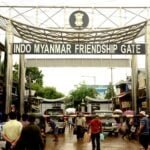Manipur is a hill state. The genuine essence of the traditional relationship amongst various people of the erstwhile kingdom which was a predecessor of the present state of Manipur is best manifested in the popular word” Chingburoi Tamburoi”, meaning oneness of the people in the state. We should protect the common ethos and cultural heritage of Manipur.
The Chingburoi Tamburoi word is the expression inspired by affection, bonding, friendship, and goodwill which characterized the relationship amongst all people who contributed to making this civilization that led to the growth of the erstwhile kingdom since time immemorial.
However, when some outsiders who never participated in making this civilization and the growth of the erstwhile kingdom of Manipur interfere in the internal affairs of a state, the social fabric of Manipur is challenged. These outsiders for their own selfish interest, try to divide the communities living together with false history and narratives.
In the last few years, the very existence of common history has been challenged by people like Mark Thangmang Haokip, a Myanmar-based self-styled human rights activist, backed by politicians like Lamtinthang Haokip. Their false narratives on Mount Koubru and Thangjing hills have been contentious issues for the last few months. They have been circulating false propaganda that Manipur land is only 700 sq miles when Manipur merged with India, directly challenging the ethos and cultural heritage of Manipur. They have been continuously misguiding the common people who do not have access to the official documents and are not much aware of the common history and cultural heritage of Manipur.
Mount Koubru, Thangjing hills, Nongmaijing hills, Makhel, Wangbren, Kangkhui caves, Hungdung, Tharon caves, etc are the common property of the people of Manipur, epitomizing the concept of Chingburoi and Tamburoi. Hence they are the important heritage sites of Manipur and the Indian Nation. However, a situation has arisen in the recent past when Mount Koubru and Thangjing hills have been claimed to be the sole property of a particular community that has settled in these hills only recently.
This claim is the negation of the more than 2000 years old history of the Civilisation and erstwhile kingdom of Manipur. The false narrative of these areas being the ancestral lands of a particular community has been manufactured and propagated by some persons of dubious nationality. And Mark Thangmang Haokip is one of them. They have also been responsible for encouraging mass poppy plantation in the reserve and protected forest areas of Manipur. This also has led to the increase in the smuggling of drugs from golden triangles. In fact, the epicenter of the poppy plantation and drug manufacturing has shifted to the Indo Myanmar border, including the areas of the Manipur since the year 2002. plantations. The claim to ancestral lands excluding other communities seems to be for facilitating poppy cultivation and manufacture of drugs.
Those who challenged the very idea of the common existence of different indigenous communities in Manipur are actually outsiders. They failed to understand and feel that Koubru is the holiest mountain of Meetei, Kabui, Thangal, Koireng, Liangmai, Rongmei, Inpui, Zeme, etc. as they have never been a part of the history. Similarly, Thangjing is the sacred place for the Koireng, Meetei, Kabui, etc. But this is not so for the Thadous and the Khongjais who had shared their part in making the common history of Manipur.
For people like Mark Haokip and Lamtinthang Haokip their agenda seems to be to undermine this common history that binds the people of Manipur and divide Manipur for fulfilling their political aspirations.
Even after knowing all the past relationships amongst the people of Manipur starting from time immemorial, few narcissist writers and leaders intentionally bring out false narratives to divide the people of Manipur. Of them, Mark Thangmang Haokip stands out. As per his Instagram profile, the Nationality of Mark Thangmang Haokip is Myanmar. He is a habitual offender, and his every post on social media is mainly to rewrite a concocted history, with clear agenda to divide the people of Manipur. Last year he made derogatory remarks against freedom fighter Rani Gaidinliu to tarnish the image of the Kabui leader as well.
He was trying to create political issues based on some unverified documents, instigating common people to go against the policies of the government which is meant to benefit one and all. His recent tweets reveal that he has made up his mind to divide the people of the State. He was directly challenging the State government’s sincere effort to protect the reserve and protected forest areas of Manipur, which is aimed to protect the environment benefiting the people of Manipur as a whole as well as the Nation and human civilization.
He has falsely projected the protection of forest areas to ethnic cleaning campaigns, thus instigating innocent people to go against the government policies. The result of his vicious hate campaign is reflected in the violent protest by his supporters in some areas of Churachandpur and Kangpokpi district.
The government is right in its effort to prevent further damage to the composite culture and ethos of Manipur by people like Mark Thangmang Haokip and other leaders. People of Manipur must do everything to protect the common ethos and cultural heritage of Manipur for the peaceful co-existence of different communities of Manipur and to help in making a stronger Indian nation.
Feature photo credit – Deepak Oinam
Naorem Mohen is the Editor of Signpost News. Explore his views and opinion on X: @laimacha.
2 thoughts on “We should protect the common ethos and cultural heritage of Manipur”
Comments are closed.


[…] Mark has been portraying CM Biren as anti-tribal throughout his tweets and Facebook post. Mark Thangmang Haokip claimed himself as the self-styled President of International Human Rights Association which was […]
[…] anti-national, anti-state, anti-social, Communal, and divisive agendas which cause disturbance in existing peaceful social harmony and law and order situation of the State. The members of these groups spread and push their […]